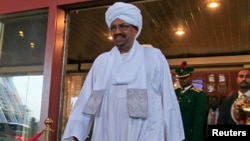Sudan's President Omar al-Bashir has left Nigeria after calls from human-rights activists demanding his arrest on war-crimes charges.
The Sudanese leader flew back to Khartoum on Monday, less than 24 hours after he arrived in Abuja for an African Union summit on AIDS that runs through Tuesday.
In an interview with VOA, the undersecretary of Sudan's Foreign Ministry said Bashir's departure was not related to the calls for his arrest.
"As far as we are concerned, nothing happened. He was there, he attended the summit, and when the summit is over, he came back," said Osman.
The official, Ramatallah Osman, said the president would not have gone to Nigeria if there was a threat to his safety.
While Bashir was in Nigeria, activists filed suit in the country's Federal High Court in an effort to make authorities arrest him.
The Sudanese president is wanted by the International Criminal Court on charges of genocide, war crimes, and crimes against humanity in Sudan's Darfur region.
The ICC said Tuesday it had asked Nigeria to arrest Bashir and hand him over to the court's custody.
Human Rights Watch, which called Bashir's visit an affront to his victims, argued that Nigeria was obligated to arrest Bashir because of its membership in the court.
5 counts of crimes against humanity:
A Nigerian presidential spokesman had indicated that authorities would not arrest Bashir. The spokesman said Bashir came at the invitation of the African Union, which has supported Bashir's refusal to surrender to the ICC or accept the court's authority.
The ICC accuses Bashir of orchestrating crimes including murder, rape and extermination against civilians in Darfur, where rebel groups have been fighting the Bashir government since 2003.
Bashir has denied the charges and defied the ICC's warrant for his arrest, but is careful to visit countries only that are not members of the ICC or have guaranteed his safety.
Several African countries including Kenya, Chad, and Djibouti have granted entry to Bashir, while others, including South Africa, have refused to let him in.
The Sudanese leader flew back to Khartoum on Monday, less than 24 hours after he arrived in Abuja for an African Union summit on AIDS that runs through Tuesday.
In an interview with VOA, the undersecretary of Sudan's Foreign Ministry said Bashir's departure was not related to the calls for his arrest.
"As far as we are concerned, nothing happened. He was there, he attended the summit, and when the summit is over, he came back," said Osman.
The official, Ramatallah Osman, said the president would not have gone to Nigeria if there was a threat to his safety.
Omar al-Bashir Bio
Omar al-Bashir- Born January 1, 1944 in Hoshe Bannaga, Sudan
- Graduated from Sudan Military College in 1966
- Rose through the ranks of Sudan's army
- Came to power in a 1989 coup
- President of Sudan since 1993
- Subject to the first ICC case against a sitting head of state
- ICC issued an arrest warrant for Bashir in March, 2009
The Sudanese president is wanted by the International Criminal Court on charges of genocide, war crimes, and crimes against humanity in Sudan's Darfur region.
The ICC said Tuesday it had asked Nigeria to arrest Bashir and hand him over to the court's custody.
Human Rights Watch, which called Bashir's visit an affront to his victims, argued that Nigeria was obligated to arrest Bashir because of its membership in the court.
Charges Against Sudanese President Omar al-Bashir at the ICC
Charges Against Sudanese President Omar al-Bashir at the ICC5 counts of crimes against humanity:
- murder, extermination, forcible transfer, torture, rape
- intentionally directing attacks against a civilian population and pillaging
- genocide by killing, genocide by causing serious bodily or mental harm and genocide by deliberately inflicting conditions of life calculated to bring about a group's physical destruction
Source: ICC
The ICC accuses Bashir of orchestrating crimes including murder, rape and extermination against civilians in Darfur, where rebel groups have been fighting the Bashir government since 2003.
Bashir has denied the charges and defied the ICC's warrant for his arrest, but is careful to visit countries only that are not members of the ICC or have guaranteed his safety.
Several African countries including Kenya, Chad, and Djibouti have granted entry to Bashir, while others, including South Africa, have refused to let him in.





